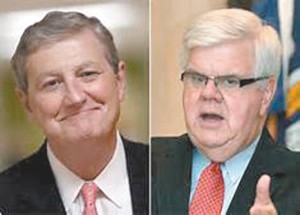Democrat Foster Campbell in runoff with Kennedy
14th November 2016 · 0 Comments
By Christopher Tidmore
Contributing Writer
The Democratic smart money was on Caroline Fayard, but she couldn’t overcome the decades of support from rural and North Louisiana Democrats that Foster Campbell had built up.
Fayard had attempted to put together a coalition strikingly similar to Hillary Clinton’s national voter constituencies. The New Orleans attorney sought to join African Americans and Hispanics with progressive whites particularly on the I-10 Corridor from the Crescent City to her family’s political base outside of Baton Rouge.
It only ended up earning her a fourth-place finish at 10 percent of the primary vote, behind Charles Boustany and his Cajun support, and behind the 17 percent that Foster Campbell would earn by joining the remaining rural “prairie” Democrats to the courthouse democratic political structure that has propelled him to the public service commission repeatedly. Remaining aid came via his friend and ally Governor John Bel Edwards who encouraged undecided Democrats to opt for Foster Campbell.
He will face Republican State Treasurer John Kennedy in a December 9 runoff. The PSC Commissioner acknowledges that he has an uphill battle, but he contends it’s one that he—uniquely amongst Democrats currently in office—is poised to win. Campbell believes he can tap into at least part of the Caucasian anti-establishment anger that has up-ended the national political world this fall.
The veteran North Louisiana Public Service Commissioner styles himself one of the last “Populists” in the tradition of Huey Long. As he explained in his justification for standing this year for the seat vacated by David Vitter, “I’m running for the U.S. Senate to be a voice for the people, not the powerful. After eight years of Bobby Jindal’s destruction, we have a lot of work to do. I’m an experienced leader, and my record proves that I know how to cut through gridlock. I’m also proud to be running with the support and endorsement of Governor John Bel Edwards, who has tapped me to be his partner in D.C. to fight for our people and get our state back on track.”
When asked what was the specific architecture of a successful Senatorial win in December for a Democrat, he answered, “The pathway for any Democrat in the runoff is to do what our Governor did. I’ve reassembled his GOTV team statewide. Unlike him, though, I start with a base of a million people. Recent polling shows that 8 percent of Republicans will vote for me over [John Kennedy]. That alone gets me close to a 51 percent majority when combined with the traditional democratic base.”
“My appeal to voters transcends party because it comes from the heart. I have the resources we need to deliver targeted messages to every demographic. On the same day Mary Landrieu lost, I had 62 percent of the vote in the same 24- parish area of north Louisiana where she had 41 percent of the vote. I have the ability to attract votes regardless of party. With a Democratic base of about 40-42 percent in Louisiana, a Democrat must have the credentials to attract more than just Democrats. I do.”
“The support of our governor cannot be underestimated. His approval numbers remain incredibly high after his expert handling of recent flooding and shootings over the summer.”
“My resume is also uniquely situated to contend with any of the front-running Republicans in the race: it’s full of concrete examples of fighting for consumers on kitchen table issues that matter to voters. And on ‘Louisiana values’ issues, no Republican has the credibility to criticize my proven record.”
He lists his top three campaign planks as “1. Equal Pay for women; 2. Raising the minimum wage to help Louisiana families; [and] 3. Fully funding our coastal restoration master plan to combat coastal erosion and all its causes, including man-made climate change.”
He also added, “Other issues that are also of import to me and our people: Maintaining a strong national defense and doing whatever it takes to keep America safe, including improved relations with and more accountability for our allies around the world; Bringing our tax dollars home to reinvest in our people; Ending the crippling effect of student loan debt by allowing students to refinance when interest rates go down, linking PELL grants to inflation, and expanding current loan forgiveness programs to cover more people and more debt; Protecting Social Security; Improving K-12 education and creating access for high quality, universal pre-K by age 3; Paid family leave; [and] Improving access to high-quality primary, mental, dental and optical health for everyone through investments in facilities and programs like Louisiana’s network of Federally Qualified Healthcare Centers.”
When asked why he was more qualified for this office than his opponent, Foster Campbell replied, “Some in this race claim to be ‘fiscal conservatives.’ Usually, that means they want to cut only the parts of government that create opportunity for regular people. But I think real fiscal conservatism means using resources to reinvest in people. That’s why I created the Educational Excellence Fund – a $1 billion fund for K-12 education –built from a legal settlement with the tobacco companies. We spend the interest in the classroom only, helping schools in every parish of the state make their budget each year. No one has ever engineered an investment like that in Louisiana schools. It was tough, and some people wanted to fight it, but I persevered because I knew it was the right thing to do.”
This article originally published in the November 14, 2016 print edition of The Louisiana Weekly newspaper.



